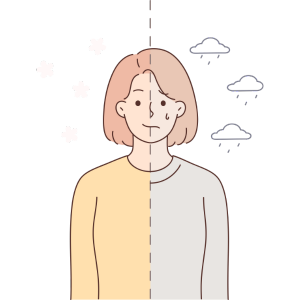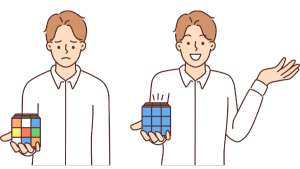September is one of my favourite months. It’s larch season in Alberta, we get all the beautiful colour changes, it’s just before Halloween (my favourite holiday) and it’s still nice enough to enjoy the fresh air.
But the downside? It is still dark when you commute to work, the days get shorter, and you just know winter is around the corner. For me, this affects my overall mental health. Unfortunately, I do not have control over the seasons or sunshine, but I like to optimize the things I do have control over to ensure I’m feeling and functioning my best heading into the LONG Alberta winter. And just like how I recognize the weather and seasons impact my mental health, there are many factors that contribute to optimal mental wellness, including my personal favourite topic Hormones.
There’s a deep connection between our mental health and hormones. Hormones are like the messengers of our body’s internal communication system, and they have a significant say in how we feel emotionally and mentally. When our hormones get out of balance or fluctuate, it can really throw our mental health for a loop. This underscores a crucial point: taking care of our mental health isn’t just about addressing our thoughts and emotions in isolation. It’s about looking after our whole selves, like I always say, addressing mental health from a perspective of optimizing pillars of wellness: Movement, sleep, nutrition, mental wellness (including stress management), and hormones. It’s a reminder that a healthy body contributes to a healthy mind, and vice versa – they’re inextricably linked. How hormones influence mental health varies from person to person and depends on which hormones are involved. Let’s break it down by hormonal conditions:
Premenstrual Syndrome (PMS): Refers to a set of physical and emotional symptoms that many women experience in the days or weeks leading up to their menstrual period due to fluctuations in hormones.
- Symptoms of PMS vary widely from person to person but often include:
- Mood changes: Mood swings, irritability, anxiety, anger.
- Physical symptoms: bloating, breast tenderness, headaches.
- Food cravings: Especially for sweet or salty foods.
- Sleep disturbances: Difficulty sleeping or changes in sleep patterns.
Then there is PMS’s more aggressive sister, Premenstrual Dysphoric Disorder (PMDD). This is a more severe form of PMS. PMDD is characterized by more intensive emotional and physical symptoms and can significantly interfere with a person’s daily life and functioning. So, while the symptoms can be similar, PMDD becomes more extreme, with women experiencing suicidal thoughts, withdrawal from their normal day-to-day routine, and even challenges making decisions.
PCOS (polycystic ovarian syndrome): is a hormonal condition that affects women both physically and mentally. While the pathophysiology remains largely misunderstood, women with PCOS are 3x more likely to be diagnosed with anxiety or depression than women without PCOS. The connection between PCOS and mental health is multifaceted, and several factors contribute to this relationship, including:
- Hormonal imbalance: PCOS is characterized by imbalances in sex hormones, particularly elevated levels of androgens (male hormones) and insulin resistance. These hormonal fluctuations can affect mood, energy levels, and emotional well-being.
- Anovulation: Irregular or absent menstrual periods are common in PCOS as a result of hormonal irregularities, which can contribute to mood swings, anxiety, and depression.
- Low progesterone: Individuals with PCOS often have low progesterone, and progesterone plays a complex role in the central nervous system (CNS), including its interaction with gamma-aminobutyric acid (GABA) receptors. GABA is the primary inhibitory neurotransmitter in the brain, meaning it has a calming or inhibitory effect. Therefore, when individuals have low levels of progesterone, they are not reaping the benefits of its anti-anxiety and calming effects through the interaction with GABA and the CNS.
- Physical symptoms: Women with PCOS often have symptoms such as excess hair growth on the body, weight challenges, and acne, which can affect self-esteem and body image negatively, impacting overall mental wellness.
Treating the psychological symptoms of PCOS involves understanding the root cause and targeting treatment accordingly. Treatments like insulin sensitizers, progesterone, and oral contraceptives can play a role in managing PCOS symptoms, regulating cycles, and ultimately helping improve the psychological symptoms associated with PCOS.
Perimenopause, Menopause and Andropause (the male menopause): There are many parallels between hormonal fluctuations in both men and women as they age. Here’s how the decline of hormones in both men and women with age impacts mental health and wellness:
- Mood Changes: For both men and women, hormonal changes with age can result in mood swings, irritability, heightened emotional sensitivity, sadness or depression.
- Anxiety: Hormonal fluctuations can contribute to anxiety symptoms, including restlessness, nervousness, and worry.
- Fatigue and Reduced Energy: Declining hormone levels in both sexes can lead to fatigue and reduced energy levels, affecting motivation and overall mental well-being, which can often be mistaken for “depression.”
- Sleep Disturbances: Hormonal changes can lead to sleep disturbances. Poor sleep can result in mood disturbances, irritability, and increased susceptibility to mental health issues.
- Cognitive Changes: Hormonal decline with age in both sexes can be linked to cognitive decline, including impairments in memory and cognitive function. Cognitive changes can lead to frustration and contribute to feelings of anxiety or depression.
- Loss of Libido and Sexual Function: For women, hormonal changes can lead to a decrease in libido, vaginal dryness, and discomfort during intercourse. For men, hormones play a key role in sexual function and libido. A decline in hormone levels can lead to reduced interest in sex, erectile dysfunction, and other sexual performance issues. These changes for both sexes can result in frustration, anxiety, and a negative impact on self-esteem and relationships.
- Body Image and Self-Esteem: The decline in sex hormones for both men and women, can contribute to changes in body composition, including increased body fat and decreased muscle mass. These changes can affect body image and self-esteem, potentially leading to mental health issues.
For both men and women during this life transition, the management is the same. Identify the root cause of the mental health concerns and treat it accordingly. And of course, that can be multifactorial! Treatment options are always individualized but can include hormone replacement or optimization therapy, psychotherapy, such as cognitive-behavioural therapy (CBT) or talk therapy, and/or medications like antidepressants or anti-anxiety medications.
I hope this has helped clarify some of the ways hormones can impact our mental health!
Mental wellness is so important to our overall health, quality of life, and longevity, it’s one of the pillars of wellness I talk about during all my hormone consults.
Other pillars, movement, sleep, nutrition, and hormones are important to optimize to maximize mental wellness. Optimizing the pillars of wellness is like solving a Rubik’s Cube.
Picture each aspect of wellness as a different face of the cube, representing physical health, mental well-being, nutrition, sleep, and hormones. Initially, your wellness might resemble a scrambled cube, with various facets out of balance. Like solving the cube, optimizing wellness involves recognizing its complexity, adopting a holistic approach, planning strategically, adapting as needed, and above all, displaying patience and persistence. As you address each aspect methodically, you begin to achieve harmony and balance in your life, much like the satisfying feeling of solving a Rubik’s Cube.
Shelby Sheppard
Nurse Practitioner
Follow us @hormone_optimization


